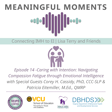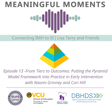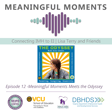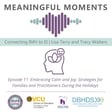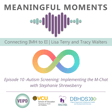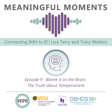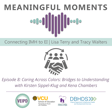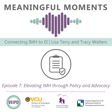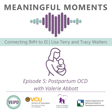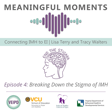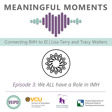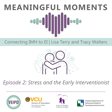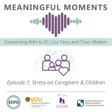Podcast Introduction & Sponsorship
00:00:10
Speaker
Welcome everyone to our podcast, Meaningful Moments. We are so excited to be here with you today and we are going to talk all about promoting gratitude. Thanksgiving's right around the corner and we feel like this is such an important message, especially when we're thinking about infant mental health.
00:00:29
Speaker
But first, let's get to our sponsorship message. This podcast is a collaborative effort from the Virginia Department of Behavioral Health and Developmental Services through a contract with the Partnership for People with Disabilities at Virginia Commonwealth University.
Hosts' Introduction & Roles
00:00:46
Speaker
My name is Lisa Terry. I am an early intervention professional development consultant here at VCU's Partnership for People with Disabilities. I am also endorsed as an infant mental health mentor in research and faculty. I am a co-facilitator for DEC's Infant Mental Health Community Practice, as well as a zero to three growing brain trainer. And I'm going to go ahead and let my co-host introduce herself. Tracy, go ahead.
00:01:14
Speaker
Hey guys, so happy to be here with you. My name is Tracy Walters and I'm the state coordinator for Infinite Early Childhood Mental Health in Virginia. I get to work side by side with Lisa. I am also an incredible years trainer and so get to do lots of work with children and families in that way. So happy to be with you guys today.
Why is Gratitude Important?
00:01:38
Speaker
So let's go ahead and get started and really start talking about this and breaking it down, Tracy. So when we're thinking about promoting gratitude, what is the first thing that comes to your mind? Oh, my gosh. Well, for me, Lisa, I think when I start thinking about gratitude, I really start thinking about being present in the moment, right? And really just thinking about all that we do have to be grateful for and also that positive mindset that
00:02:03
Speaker
comes about when you're thinking about gratitude. How about for you? Yeah, I think so too. I think about that positivity. I always think about people that you are around that just have this positive presence and you just truly enjoy being surrounded by everything that they're holding with them, just the joy as they're speaking to you, as they're looking intently at you.
00:02:30
Speaker
you can just tell that they have such a positive outlook on life, which is always interesting to me too, because having that positive outlook on life is really part of somebody's temperament, right? When we think about that and we break that down. And so I just always think that we can also be a lot more intentional about how we're promoting gratitude, how we are presenting ourselves and coming to the table. And so I think this is a really interesting thing that we're gonna talk about today.
00:02:57
Speaker
Absolutely. And I don't think the timing could be any better because soon we'll all be with our friends and families hopefully. And so we can really put our centered thinking on that time that we have with them and maybe practice some of what we're going to talk about today. So I'm just going to launch in then.
Research on Gratitude & Mental Health
00:03:15
Speaker
So we can just cover some of this great content for everybody and hopefully it will kind of like frame your thinking for the upcoming week.
00:03:24
Speaker
So one of the things we want to talk about was promoting gratitude for mental health. And we found this really good research and article out of Children's Hospital of Colorado that we thought was some really interesting work to share. I'm just going to kind of highlight basically what that told us, which was that in order to promote gratitude for mental health, we want to address alarming trends. It is critical to put forward
00:03:51
Speaker
deliberate efforts to help families restore and maintain good mental health. And that's what we talk about on this show all the time, right? How we're doing that. One simple yet highly effective prevention and intervention strategy is to promote daily practice of evoking gratitude. And I just love the way that they kind of highlighted that, that we have to evoke gratitude. We should think about it intentionally.
00:04:18
Speaker
Research has identified connections between gratitude and positive emotions, improved health, stronger relationships, and the ability to cope with adversity. Additionally, a recent med analysis review in 62 studies on gratitude included samples of children. I know it's a lot, right? 62. So it tells you how much people are digging into this information.
00:04:45
Speaker
It included samples of children, adolescents, and adults. They found a robust connection between higher levels of gratitude and lower levels of depression, which is great news for all of us. And then another note is one of the pediatric psychologist, Jenna Glover, PhD, she said that providers should utilize this knowledge and promote daily family practices related to gratitude.
00:05:13
Speaker
These practices really help youth and adults develop a positive outlook on life. And it allows for pleasant experiences to deeply be enjoyed and newly learned skills to help offset adversity. And I love that thinking, Lisa, around parents and children doing this alongside each other, right? And families really being able to model this
00:05:40
Speaker
because this is how these behaviors and habits are formed. Just like you were mentioning earlier about being in the presence of positive people, you can feel that in families too. When we're centered and we're really content and we're promoting that gratitude practice, our children, they emulate that. They emulate it. So it's definitely something that we wanna be promoting
00:06:09
Speaker
And I will say too, you know, positive psychology has really been coming up in the last five to six years. It's become like such a stronger field. So much more attention is being spent to it. And I found this article that was called the neuroscience of gratitude and the effects on the brain. And we will make sure that we get it in the show notes. But again, it was just linking this
00:06:35
Speaker
uptake and gratitude and how it reduces stress and anxiety for individuals. So the more we can practice it, the better it is for all of us.
How to Practice Gratitude Daily
00:06:44
Speaker
Right, Tracy. I just think, you know, that positivity, it's contagious. So when you're promoting gratitude, that is something that you're also modeling for other people, and they're going to have a better outlook on life. You just feel good when you're around people that are evoking this, right?
00:07:04
Speaker
And so we are going to get into the tips from this article. And I love this article. And I love how they really highlighted all of this and focused on different strategies. And so one of the biggest things that they said is when we're thinking about practicing gratitude, that it's just something that's easy, really. It's really easy to implement. It takes a little effort as you're doing it and a little time as you're integrating it naturally into your life.
00:07:32
Speaker
Yeah, I mean, I think that is what makes the most sense, right? Because any time that we can integrate something into our daily schedule without it being a specialized thing, it's so much easier for us to get to. It brings normalcy to the process, right? And it can start out very little, a very small thing, and then it can get bigger as time goes on.
00:07:54
Speaker
So that's a great tip. Well, so yes. So that's our first tip is making it routine, right? And finding those consistent times that you are going to tap into gratitude and you're going to spread these experiences throughout your day. So the example that they gave was first in the morning, what you're going to do is just start off by identifying an opportunity or a circumstance of something that's coming up in your day that day.
00:08:23
Speaker
and you're looking forward to it. So for example, like this morning, I was thinking about even us recording this podcast. And I was really excited about our episode today and just how thankful I am that we even had this opportunity to highlight promoting gratitude today. I think that was really important. Another thing that they said is that before you go to bed,
00:08:48
Speaker
really think about something that you appreciate, that you experience in that day. So any kind of daily activity that it can be an opportunity for you to really name and feel the gratitude. I think when you're making it part of your routine, first thing in the morning, you're starting off feeling good, right? Like I am going to have a great day today because I am so thankful for this opportunity that I'm going to have later.
00:09:18
Speaker
And then you were reflecting on it before you go to bed. Okay. This was such a great opportunity that we had today and it just feels good, right? So you're going to bed feeling good.
Building Positive Mental Health Habits
00:09:30
Speaker
You're waking up feeling good.
00:09:31
Speaker
And those are really important things to start off. It's kind of like, you know, when you make your bed in the morning, you just feel a lot better. Like you feel like you accomplished something and you're starting off your day right. I think promoting gratitude from the beginning to the end is just a great way to start and begin your day. Yeah, Lisa, I think you're right. And I'm kind of giggling over here because I think there was a military person, if I'm not mistaken,
00:09:59
Speaker
that just actually did a lecture series, and there may even be a book on the practice of making your bed, right? And just how that promotes, like, good habits. And this is exactly what this is. It's about building positive habits. And we all know, you know, there's lots of conversation out there about, like, if you do something for 30 days, right, it becomes a habit. And so this idea that you're talking about, like, you know, in the mornings, like, when you first wake up, set that
00:10:27
Speaker
reframe for yourself about a positive thing, something that you're grateful for. And then at night too, that whole reframe about what went well that day or something that you can be grateful for that happened. Really, it is all about those building positive habits. And there's whole science behind that that's linked to this. So it's really important to think about. Another great tip that was in here was like focus on what is working, right? And this is so important.
00:10:55
Speaker
Unfortunately, our minds are often wired to look at what's not going well, right? And we've talked about this before, like, in other contexts. Like, we are a fix-it society. We want, like, if there's a problem, we want to nail it. We want to fix it. But really focus on what is working. So when obstacles and negative filters dominate your thoughts, identify what's working right now to help balance that stress. I think that's so important.
00:11:23
Speaker
And then this can be helpful for individuals and group practice, right? So it can be something that you're doing for yourself. It can be something that you're evoking and helping others with. And it can simply start by acknowledging and validating the difficulties that you're facing and really forming some good habits of checking in and really validating the things that are going well. So for me, this reminds me of a lot of information that I've read all about the mindset, right?
00:11:53
Speaker
Simon Sennick has done a lot of work on mindset and there's so many business leaders who talk about positive mindset and this is kind of what this digs into for me. It's like just really looking at getting away from that deficit thinking and leaning into that positive mindset and letting that form these habits that we're talking about. Is that making sense for you, Lisa?
00:12:18
Speaker
Yeah, Tracy, you know, because I think about, and we talked about this in our earlier episodes when we were talking about stress and just the impact of stress. And really a lot of times if we have these negative thoughts, it's stressful, right? Your heart starts to elevate. You just feel this sense of heightened anxiety.
00:12:38
Speaker
And so that those are big feelings that you have, you are evoking them with any kind of feelings of stress, those are huge feelings, and it tends to take over your whole body. And so what you're saying is to really help balance that by
00:12:54
Speaker
adding those positive thoughts and having a better outlook on life and what is working, what's going well. Yes, we know that we can always reflect on things and how we can make, you know, look at those, take those negatives and learn from them and grow from them. But by really focusing on more of those positives,
00:13:13
Speaker
you're going to help alleviate some of that stress too, right? And so I think that makes perfect sense. And I love, you know, just having that view and that outtake of really thinking about, okay, this is working so well for me today, even thinking about the families that we're serving. Sometimes I think you can get so caught up on
00:13:35
Speaker
you know, feeling like I'm not doing enough to help these families or this isn't working, right? And you fixate on that, right? But you've got to think about what is working. That relationship, that rapport that I'm building with the family, that's working. Those responsive interactions that that parent is having with the child, the engagement, the level of engagement they're having with them, that's working well. So really breaking it down to that too. Yeah, I think you're right, Lisa. And I think
00:14:05
Speaker
Because of the nature of the work that early interventionists do and, you know, all of us working with children and families, I think it's so easy to look at what didn't get done, right? How much there is still left to be done. I know we walk out of home visits and we have lists and we have notes and, you know, just thinking through all of the pieces that flood our mind, right, and our hearts when we're thinking about the children and families that we're serving.
00:14:31
Speaker
And I think that it is easy to get into that deficit mindset. So really making this an intentional practice, right? And really thinking about what was the one thing, even if you do a balance of, I used to say this to my daughter when she'd come home from school, tell me one thing that went well and then one thing that didn't go well. And I thought that's at least creating balance, right? Because we always want to think about
00:14:59
Speaker
something that didn't get done. So if you can get that kind of out of the way and then say, now tell me something that did go well, it's such a positive experience and bringing balance to our lives in this way is really important.
00:15:12
Speaker
Yeah. And I'll say one more thing before we move on. But I was just thinking about that when you're talking about the documentation piece, like contact notes are never my favorite thing to write. But honestly, when I am trying to reframe it more into a positive, when I am writing those contact notes, it's such a great reflection to me of what I'm doing with the families, what the parent and the child have been achieving over time.
00:15:39
Speaker
And it's nice like when you actually like write it down and you get to reflect on it and you get to think about how did that visit go or what are things that I could do better next time or how can we move forward? I just love kind of reframing it and that mindset because yes, they are time consuming. No, that's not my favorite thing to do. But when I'm actually sitting there and I'm doing it, I'm like, wow, like this is really important work that we're doing. And so I do appreciate it. So the next,
00:16:05
Speaker
Oh, sorry, did you want to say anything? I was just gonna say, yeah, I think that reinforces a lot of what we talked about. And, you know, of how important that reflection time is, right. And it does move beautifully into this positive thinking bit. So yeah, thanks for bringing that up, Lisa.
Nature & Well-being
00:16:23
Speaker
So the next strategy is tap into one, excuse me, tap into wonderment and all, which I just love hearing those words first, but feelings of that wonderment and all, they're really restorative to both our physical and our mental wellbeing.
00:16:40
Speaker
And so some of the strategies that they mentioned was just getting outside each day and really paying attention to nature, which right now we have the beautiful colors of leaves changing here in Virginia. And I love just driving down the road and when you have all these leaves and the wind blowing and the leaves are blowing all over the place, but thinking about those kind of things and paying attention to them.
00:17:04
Speaker
The sun rises, the clouds passing, right? If you live near mountains and looking and appreciating those, it's so funny because
00:17:13
Speaker
you know, like here in Virginia Beach where I live, we don't really have as many mountains. Like we have a Mount Trashmore, which is like a little man-made mountain that we made that we turned into a park, but we have beaches and things like that. And every time I go somewhere where people have like more mountains and I'm like, I am just in awe because I never get to see how gorgeous they are and just the scenery. And it's just so breathtaking to me because we don't have that. And one of my friends that lives in mountain, she's like,
00:17:42
Speaker
Oh, I see it all the time. It doesn't mean anything to me. I'd rather have the beaches that you have. And so I think sometimes it's so easy for us to really take for granted just the pure beauty of the world around us, but really taking the time to close your eyes. And even if it's for a brief moment, but really noticing those feelings of connection and gratitude for our world and for nature and for what is there around us, right? Yeah. Oh, absolutely.
00:18:12
Speaker
You know, my mind is jumping to, we'll have to put in the show notes, but Dr. Sanjay Gupta, you know, he's a CNN correspondent and he does a lot of work, media work, but he has recently done a series of podcasts on the brain. And so one of the podcasts is on the rested brain. And so it brings up a lot of what we're talking about here today.
00:18:37
Speaker
where he really talks about what you need to do to keep your mind in good shape, right? He's done a lot of brain work over the last few years. But it's simple things, just like we're talking about, like really taking a nap, if you can take a nap, closing your eyes, if you can just close your eyes for a few minutes, disengaging from your technology. But he gives lots of strategies too. And a lot of it is so aligned with what we're talking about here. It's like this restorative practice, right?
00:19:04
Speaker
And I think what you were saying about what we take for granted, Lisa, this is a huge one too, right? So that's one of the tips is just, what are we taking for granted? So there's many parts of our day-to-day life that we often really fail to think about and truly appreciate. And I think that's something that we need to be more intentional about. It's really easy for us not to look at the things that are going well, but sometimes we look at simple things and we just,
00:19:33
Speaker
We don't think about them until something's broken, right? So like if you have, you know, examples might be including something to appreciate would be like having shelter, having food, having warm and running water, right? When we look at things globally right now that's going on, I know that's the thing that's on my mind and on the mind of a lot of folks who work with children and families. Looking at a lot of families around the globe right now that are in distress.
00:20:01
Speaker
and just thinking about the things they don't have really turns my mind to how fortunate we are and how fortunate the children here are with the things that they do have in their lives. And so I think just being appreciative of those and not taking up for granted again is a practice though. And it is part of that reframing how we think about things. And you can change this practice, this deficit thinking,
00:20:29
Speaker
To more positive thinking but it is a daily practice and like you said, you know, maybe just a few minutes out of our day Each day is an important way to to approach it Right. It's so funny Tracy because like as you're saying that I'm sitting here and I'm looking around and I'm like, okay What is it that I can say that I am thankful for that? I have I'm thinking about I'm thankful even for having a glass that I can put my water in or having hot tea here too, you know to
00:20:58
Speaker
Soothe my throat when I need it. I'm thankful for internet access that we have the ability to do that and these cameras and I know like Some of you might be just listening to us through the podcast the audio version But we also do a YouTube version and so we're able to record it and also offer it in that format as well but I'm really thankful about that so even just by taking a moment to pause and think about the things around you and look around and
00:21:24
Speaker
What is it that you are thankful for? And one of the things that kind of comes to mind now is maybe I do need to be more intentional every day and just pause and do a lot of that. It's so funny because a couple of days ago our bathroom door like
00:21:40
Speaker
the lock part of it got stuck, like the, you know, where it pushes in, it's stuck now. So you can't shut the door. And we have to get a whole new door knob because you can't fix it. But I'm like, Oh, my goodness, like, I'm just thankful that we have locks on our doors. It's such a huge inconvenience, you know, now to me. But when you think about those things that you are really appreciative of, I think that that's huge.
Impact of Gratitude on Relationships
00:22:06
Speaker
Another one, and I
00:22:07
Speaker
think this is a really, really big one. And Tracy, you were actually really great about this all the time. Like, I don't think I've ever told you this, but expressing gratitude to others. That is a huge one. And really, you know, being intentional about looking at what are some big or even small things that other people are doing
00:22:27
Speaker
but telling them being vocal that you are noticing this, right? Because this is going to be something that you can really practice when you are feeling grateful, but it's also a positive feeling that's going to be a lot more amplified.
00:22:43
Speaker
when we're sharing that gratitude with a giver because I know, and I said to her, I see like you do this all the time because I know you were so intentional about doing this. And every time you do it with me, like I, you always make me feel so good. And that's a great feeling and message to spread to other people. So I think, you know, that is a really important thing. I, I will admit, like, I feel like I'm probably not always the best of trying to do that and point out the,
00:23:08
Speaker
big things or little things that people are doing, but it's something that I think I can definitely work on too. Well, Lisa, I think you're beating yourself up a little bit there. I think you do it. Don't worry. I think you're just beating yourself up. I think you do do that. I do think that everybody can become more intentional about it. I guess for me too, at the end of the day, it's how you leave people feeling.
00:23:38
Speaker
it's really how you leave people feeling. And so I really spend a lot of time thinking about that. Like there's, we know how busy your work is. I look at all the things that you have going on and all of your projects. And I think about our early interventionists. And at the end of the day, like we're all just people, right? Trying to do good work. Like we're all just trying to do good work. And so always think about that at the end of the day, I'm like, you know,
00:24:05
Speaker
It's just about the people. It's about reaching the ones that you're working with because we all need that encouragement. I just think encouragement is so important and we can get so tied into the business of the work that we're doing that it's easy to let it slip by. But it is, again, all of this is just a matter of practice. And I'm old, Lisa. I've had a lot of time to practice it.
00:24:35
Speaker
Well, you know, it's funny though, like when you're talking about it, it just reminds me, I mean, the whole foundation of infant mental health is relationships, right? Yes. The relationships, it's at the very core of it. And I think about this too, and showing appreciation to other people. But also, I'm thinking about when colleagues rub you wrong, or when there's a disconnect between you and a family.
00:25:01
Speaker
And again, kind of going back to that, that negative thinking, you can get so stuck on that sometimes. But I think this tip can actually help you really look for things that you're grateful that this person is doing. And it can change and start to shape that relationship when you are pointing that out to them and you're identifying
00:25:22
Speaker
something that you're grateful that they're doing and you're telling them about it. I think that can make the relationship shift more and also your view and your perspective on that person can shift. So I think this is a really important strategy just for relationships in general. Yeah. And I think Lisa thinking about that too, sometimes we just need to hold out hope.
00:25:45
Speaker
for families, right? We just need to hold out for each other. Just like hold it out for one another because you never know the spot that someone that you're working with is in that moment, whether that is a family that you're working with or a colleague. There's a whole backstory to every individual that we are trying to be in relationship with. And so I feel like
00:26:11
Speaker
come to it with a whole heart and at least hold out hope. And I think that that encouragement and identifying what is going well is so important. And you never know where those seeds are going to land. Those seeds can spread a long way. Just a simple acknowledgement of something that's going well can last for so long. It can change people's trajectory. I truly believe that.
00:26:39
Speaker
With that too, we think a lot about the families, the adults we're working with, our colleagues, but if we tune our minds and eyes to the children, I love this tip of showing appreciation to the kids. This is something, man, I love to dig into this piece of things because one of the best things that I've learned in my career working with children and families is that you never refuse a gift from a child.
00:27:10
Speaker
It could be a wadded up piece of paper. It could be a stone from a gravel driveway, a blade of grass. You always appreciate the effort, right, that a child brings to a relationship. If a child offers you a bite of their cookie, you say thank you, you know, you just say thank you. But really paying attention to the effort that children give and taking time to praise them when they clean up or they,
00:27:36
Speaker
You know, they do a chore or they do some kind of task without you reminding them. One of the best classes I took in graduate school was a parenting class. And one of the key things I took away was catch them while they're being good. Catch them while they're doing the things that you would like to see them do, right? So whether that is something demonstrated like child being kind to another child or a child doing a task that you have asked them to do.
00:28:04
Speaker
whatever the thing is, to reinforce that behavior. And, you know, when I'm training on the Incredible Years, this is what we talk about a lot, right, is praise for children's efforts. And with that, you know, you want to be specific. You don't want to just say, good job, right? You want to say to the child, that was a really well done that you put all your crayons up, or really well done that when your friend was crying, you went to help them.
00:28:31
Speaker
So give them the language for it, right? And as early interventionists and infant mental health practitioners, we can all do that. It's like give the children the tools that we're identifying to help them grow. I know you've had those experiences. Oh my goodness.
Teaching Gratitude to Children
00:28:48
Speaker
Yes. And Tracy, like that just brought up a lot of things that I thought about that I wanted to say, you know, one of the things that it brings
00:28:57
Speaker
up for me too is I think about as a zero to three growing brain trainer, we talk about the five R's of healthy brain development, which are relationships, responsive interactions, routines, repetition, and respect. Respect for a child. And really thinking about that child as a valuable citizen in our world, right? Because I think sometimes we can look at children as
00:29:26
Speaker
They are, they have to listen to us. You know, we want to have control over them. But really, when we are showing them appreciation, we are also showing them respect for them as a human being. And I think that can go a really long way because it's going to make that child feel good too. I also think about that book, you know, How to Raise a Child, a Resilient Child and a Self-Indulging World too. And really starting to think about how we are modeling
00:29:56
Speaker
just some of these characteristics for children. And when we are showing them that appreciation and that gratitude
00:30:03
Speaker
Those are things we are modeling. It's so funny, because last night, my youngest, he was just having a hard time. And he was just in one of his really hard fits that he was having. And we've been trying to really work on modeling, apologizing for him, too. And so I noticed there was an opportunity.
00:30:27
Speaker
my husband was like, well, you need to apologize for this and tell us, name it, say exactly what you're sorry for. And he was like, well, you need to apologize for me first for doing this. And so it was great because I could tell in that moment, that's where my husband wanted to take over that control. Like, no, no, no, no, you need to apologize to me first.
00:30:49
Speaker
And so I just had him pause. I was like, hold on. This is a great learning opportunity for us to model apologizing for him. And so I was like, you know, I think you should because you were wrong for your action and you should apologize to him. So he did. And then that's when my son apologized after that. So I think, you know, sometimes we have to get out of our own mindset.
00:31:13
Speaker
And I think his early intervention is that's what we do for parents too. Like, I mean, I was able to do that for my husband, but I think we were able to do that for parents and caregivers to really have them stop and reflect on that. What are the skills that they're modeling? What are the characteristics they want their child to have? And how are they modeling it and showing that? And that appreciation piece of it is so important because we need to also teach our children, like you said earlier, Tracy, to have that positive outlook in life. And that's going to give them that skill.
00:31:41
Speaker
So thank you for doing that and sharing that piece of it. The next one is really emphasizing manners. So that's our next strategy. So it seems like so simple and easy, but just remembering to say please and thank you throughout our day and reminding our kids really to do the same. And this could be anything from thinking someone or even a stranger that helps you out, right? Or saying thank
00:32:08
Speaker
thank you for people that are modeling kindness or demonstrating that appreciation in their lives. And I think that's probably one of the things we might take for granted is just having good manners. Because my kids will point it out to me quickly. Like if I say something or I ask something of them, they're like, say please. I'm like, Oh, you're right. And I love that they pointed out to me now. But I mean, those are things that
00:32:32
Speaker
we need to be a little bit more mindful of because it changes the way that you're saying a message to somebody, the way that you're presenting something to them. You know, like, can you go get me this cup versus can you please go get me this cup? There's a difference. There's a level of just more like being nice, you know, that comes across when you have good manners, right? Yeah, I mean, I have so much to say on this.
00:33:02
Speaker
One thing is I think that good manners is a lost art, Lisa. Yeah. I'm sad about it. I actually have to say I'm kind of sad about how we're losing the intimacy of some of this with our children. And it's not just our children, right? But I see it in adults too. And I think it's something that we all need to think about. I do think some of it is we've lost some sensitivity
00:33:28
Speaker
I mean, technology, I do not think is the root of all evil. I really don't. I love all my platforms. Love them. But I do think that we become a little desensitized by getting really roped up into, I'll give you an example, taking a walk. My neighborhood is so beautiful in the fall because it's really old trees. This neighborhood was developed in the 30s, so the trees are very old, you know? And lots of people walk in the neighborhood, but they all have their earbuds in, right?
00:33:58
Speaker
And so when I think about this thank you and please kind of situation, it also kind of goes with just even greeting each other, like saying hello or have a good day, right? And so you're right. We model these things for our children. Your children will call in you out on it. Hey, mommy, thank you or please, which means you did your job, Will. But you know, even passing people in the neighborhood, it kind of saddens me that we're also locked in.
00:34:26
Speaker
that we're a little self-absorbed. And so I think that those communications that we used to frequently use and give to extend to each other, I guess I would say, I do not see as much. And I think that we really need to be intentional in the way we're thinking about this if we want to see our children do this. And I do think it's a little bit of a lost,
00:34:52
Speaker
you know, a lost art right now. So getting back to that would be really important. Yeah, you know, Tracy, it's so funny because when you're talking about greeting people, I think about there was a place that I worked at before. It was a children's hospital.
00:35:06
Speaker
And I remember just walking down the halls and everybody was so friendly and they were just reading everyone. They're like, hey, how are you doing today? It's great to see you again. And it was just a different vibe of the whole, the different culture, you know, of just friendliness there versus
00:35:27
Speaker
when I would go to the next place that I worked at and you would walk down the hallways. And if you didn't know those people, like some people would just have their head down, they would just walk right by you. And it just
00:35:39
Speaker
I don't know. It left me feeling a little defeated, you know, during that day. Because it's almost like you take it as an insult, too. It's kind of like when people have the door open for you, or they just shut it in your face, you know, instead. And so, like, that's one of the things that is important to me. I'm like, I want to teach my boys to hold the door open for other people.
00:35:59
Speaker
Yeah, it gets back to this whole idea right of this podcast is like really evoking that gratitude and being more positive with our actions and our thinking, you know, and when you go into that positive mindset, it is displayed in how you are present physically with people, and how you are present with people emotionally. So it comes out in all kinds of ways when you start using this practice. So I'm really glad that you
00:36:28
Speaker
I kind of brought that up because I do think Lisa, depending on the environments that we're in and what's promoted, it goes back to like, what's the culture of your workplace really?
Volunteering & Community Engagement
00:36:39
Speaker
And you know, if- And what tone are you setting? Yes, what tone are you setting for people? I will add a quick note here. So you know that I'm doing that reflective leadership session like once a month with interventionists. And we were talking about
00:36:56
Speaker
the difference between management leadership this past month. And one of the things that came up was, well, that we see some of these skills as soft skills, like leadership came to mind as a soft skill. And I really had to lean into that with the group and say, we really need to think about how we're promoting these so-called soft skills, right? Because these are important. These are very important skills to have on board, how we
00:37:25
Speaker
how we greet people, how we enter into conversation, our give and take in relationship, you can't get the work done without this kind of mindset, I don't think. That's a personal, very personal for me. So relationship first, Lisa, like you said, when we think about this early intervention and infant mental health relationship first, and that leads into all these tips.
00:37:50
Speaker
The other tip that, you know, really is important for us to think about is this encouraging volunteering and donations, right? And I always love when you're thinking about donations, right? And I think about, oh my gosh, Lisa, how many grants we write for in our lifetime, right? But really just thinking about it can be a donation or it can be an in-kind donation, right? So like giving of ourselves, right? Giving of our time, giving of our efforts to one another.
00:38:18
Speaker
I always love it when I say something that I'm working on and one of my colleagues like you or Corey or Kristen or Jackie will say to me like, you know, how can I help the effort? You know, what can I do? You know, even if there's really nothing anybody can do to know that I can lean on you and say, hey, how would you word this? Or do you have any other ideas? It really prevents this feeling of being alone.
00:38:44
Speaker
and the world, and in our work. And I do think that this gratitude model supports that, and especially when we're thinking about work and volunteering. So that gratitude really breeds courtesy and kindness, generosity. And the other thing is it really does build empathy for one another. And I really think that empathy
00:39:13
Speaker
is a skill that we all need to work on and need to be thinking intentionally about because it changes how you view the world around you and then based on that how you interact with others. I agree. And I think about even volunteering and how you feel after you volunteer. It's almost like
00:39:36
Speaker
I don't know about you, but I always feel like I'm like, man, I feel like I can, you know, just conquer the world now. I feel like so good, like that I'm doing something meaningful to help my community. And those are things that are really important to me. Like in any time I can help serve my community, I want to, like I'm always supporting boards or becoming board members on things that are important to me. It's very time consuming and I'll tell you like,
00:40:03
Speaker
You know, sometimes I'm like, I'm getting so stressed out about this, but it's such good work that we're doing. And every time my husband, I'm like, oh, I got another board meeting. And he's like, but every time you go and then you leave there, you're so glad that you went. I was like, I know, but still I'm overwhelmed in the moment beforehand. But every time I always feel good. And I think that that's what we need. We need to make sure that we're feeling good about ourselves. You know, one of the other things I was going to share too, when you were talking about even
00:40:33
Speaker
leadership in that sense. One of the things that I did, we used to always like decorate our doors. And for Thanksgiving one year, when I was in an office setting in a building, I actually put up a gratitude tree. Like I made a little tree, I put it on the door and then made different leaves and people could come and write something down that they're thankful for and put it on the gratitude tree.
00:40:58
Speaker
And it was just really cool and it was a great way to set that cultural mindset, right? But also get other people involved and be a little bit more intentional about how they're expressing gratitude. So I just wanted to share that strategy too. But you know, Lisa, I think that's really important. And I recently had another conversation too that just tags my brain, just have to say it, get it out of my head. But sometimes we think we've gotten to this cultural space, I think, where sometimes we think things like that are silly, like they're not important.
00:41:29
Speaker
But they are important. They are really important to people. And I think that we need to take a second look at ways to engage and fun ways to engage each other, right? Everything doesn't have to be so serious and, like, just down to the wire. Like, you have to find joy in the work. There's a beautiful saying that I've used in my preschool for years. It says, nothing without joy. And it comes out of the Reggio inspired practice out of Italy.
00:41:58
Speaker
And they use that in so much of their education materials. And so I embrace that every day, like nothing without joy. If you're not finding some joy and it goes with this gratitude piece, you know, you may need to sit back and think should you be in this space and time with what you're doing, but nothing without joy. I agree. And I was just thinking too, before we get to our last strategy,
00:42:22
Speaker
But I was thinking about, I don't know, I guess I was just kind of thinking about how I always hear people say thinking about the children. And they're like, you know, we are raising kids to be so much more demanding and entitled now. And I'm thinking about this appreciation and expressing gratitude. But that is one way to offset that, right? Because you're not going to feel like you're entitled to everything if you are truly grateful for what
00:42:52
Speaker
you have and the little things that you have and you understand that and even volunteering and taking time, right? I know a lot of families will go and have their kids go and
00:43:03
Speaker
do like a dinner for the homeless, you know, to volunteer or donate their old toys and take them to try to teach them, you know, just morally like what are our responsibilities as a citizen too, but also not to take things for granted because you have so much more than other people. And I think that is a perspective that we need to make sure that we're sharing. It's a perspective that we need to make sure that we are showing gratitude for things.
00:43:27
Speaker
And even now, like I'm sitting here talking about this and saying this and I'm like, I need to have a conversation with my kids, you know, tonight too about this because we need to really think about that. And I need them to reflect on it a little bit more because they definitely, you know, in their world think that I want this and I want this and I want this, but they don't understand that they should be so thankful for the things that they do have. Absolutely. So I think that's something that we could all be doing, you know,
00:43:57
Speaker
Either start it if you haven't done it or just do more of it. But I think that, you know, the whole purpose of this conversation today is really just being mindful of it. Just be mindful of how to use these tips and strategies and how to bring it to the forefront of our mind. And also, not just at the holidays, right? Like we get these big warm feelings. Like I think it's nostalgia, right? We do have these nostalgic feelings about, I know I do.
00:44:27
Speaker
I definitely do. I start getting giddy around the first of November. I just do. Me too. I'm a big holiday nut. But really year round, right? And that's where that practice and discipline comes in, is using these strategies year round. I think it's so important. Yeah. So that'll take us, let's talk about the last strategy before we wrap up.
Gratitude Challenge & Conclusion
00:44:50
Speaker
And the last one is just so important. I know we talk about this all the time, but taking care of you,
00:44:56
Speaker
There has been such a just negative impact on everyone's mental health through the pandemic. A lot of people, they are just emotionally exhausted, right? They have trouble sleeping.
00:45:10
Speaker
Sometimes they just dread having to even go to work, right? Or not having some of that compassion fatigue. And it's just really important that we are emphasizing the use of gratitude for the families that we're servicing. And we're focusing on utilizing that practice on our own wellbeing. Because if you are promoting this gratitude every day in your life, and this is something, again, not time consuming, it's very easy to do, but it's also going to mentally
00:45:40
Speaker
help take care of you and the way you feel it's going to change your outlook on things. It's going to change your mindset. It's going to give you more of a positive outlook. It's going to help build those relationships with other families, with your own families, with your relationships around you, your colleagues, because you're being a lot more intentional about
00:46:03
Speaker
showing appreciation for other people too. And then they're going to feel good. And then it can have this domino effect, right? It does have that ability to, because if you are doing something or saying something nice to me, I might want to go and say something nice to somebody else who will do it to someone else and someone else. And then just think about all the lives that you've touched then. Think about how you've made people feel good. And that is so important. And that's the power of promoting gratitude.
00:46:33
Speaker
It really is Lisa. And I love just kind of like wrapping up on that note of just like the power that is in it, right? To just like think about it as a little spark of light that we can just give to each other really to promote that gratitude and being grateful in the spaces that we are. And that taking care of yourself. So true. More and more science is telling us that if we take care of ourselves, what a better place our children are for it.
00:47:03
Speaker
So if you won't and you can't feel like you can make that time for yourself, just think about how taking care of yourself and really getting in that positive mindset and being grateful supports your child's social emotional development, right? And how it really supports their mental health. Powerful language today. It gives me goosebumps just thinking about
00:47:29
Speaker
Each one reaching one, right? Each of us reaching out to each other in a way that's uplifting. I think we can all use that both today and year round. Yeah. So let's, we're going to wrap up, but let's leave you with a challenge. So as we are approaching Thanksgiving and the holidays, think about promoting gratitude. Be intentional about it.
00:47:53
Speaker
When you are surrounded by your family and friends, just pause, maybe even briefly close your eyes in that moment and just think about what you're grateful for in those moments.
00:48:05
Speaker
And I always love to, especially at gatherings, because I am a sappy person in birthday parties. Like I do this all the time with our friends. Like we go around the room and we talk about what is something that we're thankful for? What are we grateful for? Or what is it like for birthdays? We always say, what is it that this person has brought into our world that has impacted us? How have they made us a better person too? And it's just, I love that. We should be sharing the holidays because
00:48:33
Speaker
I do something similar, like we each write down something we're grateful for, and I save those little swatches of paper so that it's kind of like year to year we can see like, oh, last year we were grateful for, you know, whatever, and what it looks like year to year. So I love that. That's such a great idea because people could start a ritual. Start a ritual for yourself. It can be for yourself. It can be for your family. But the challenge is a great idea.
00:49:00
Speaker
Yes, yes. So we will leave you all with that. But thank you so much for joining us on today's episode of meaningful moments. Truly, we hope that you have the best Thanksgiving holiday. We wish you nothing but the best for all of the upcoming holidays too. And we are so thankful for you, our listeners here too, just for being with us and being present with us in these moments.
00:49:26
Speaker
Thank you for listening. Thank you for joining. We hope that you join us again next time. Make sure that you do subscribe to our podcast on iTunes. You can also subscribe on Spotify or Google Podcasts. And you can also look for our video version. Again, a lot of you are probably listening to the audio, but we do have a video version on our YouTube channel at the EIPD.
00:49:50
Speaker
So for more information, visit the EIPD's website for resources, tools, archived webinars. You can also visit VAME, V-A-I-M-H, for additional resources. And thank you all so much again. We hope you have a great holiday. Be well, everybody.

